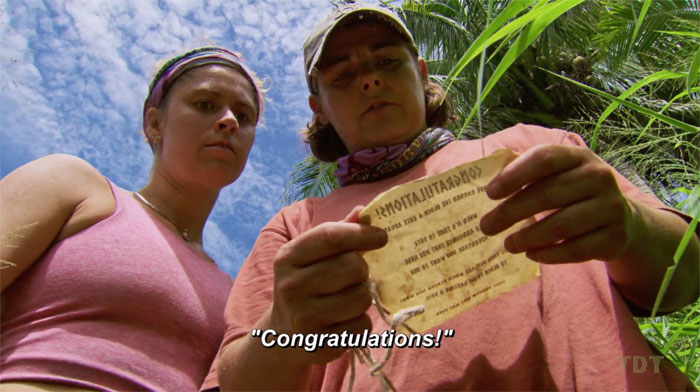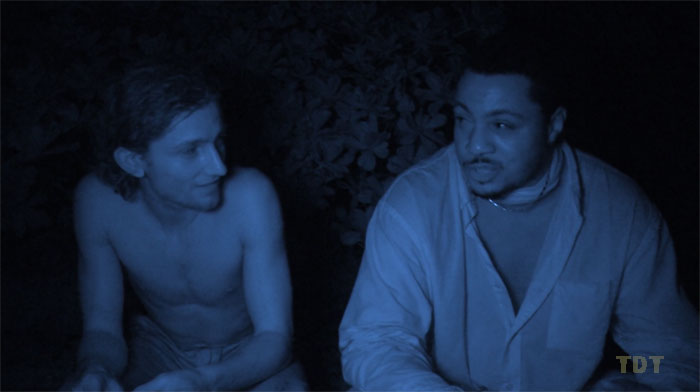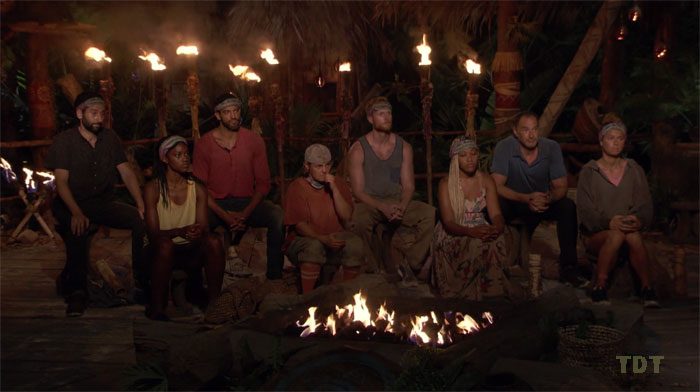

This episode of Survivor: Island of the Idols had it all (almost literally): strategic maneuvering, two challenges, a fun Island of the Idols visit, a game-shifting advantage, red herring-laden editing, a big blindside, and a sincere human moment in the middle of it all. Well, okay, it didn't have any puzzles, which apparently people think is a good thing now? But still, the best hour yet of what's thus far been a well above average season.
After a one-week hiatus, we saw the return of Island of the Idols — and while in hindsight, you could perhaps argue that maybe it was verging on production manipulating the game — on the first pass, it provided a heady rush of excitement. Just about everything related to Island of the Idols worked here:
- The snap decision to send Elaine to Island of the Idols: It was great to mix it up and use a surprise mechanism here, to keep the contestants off-balance. As a bonus, Elaine couldn't very well be penalized by her tribe for her visit, since nobody suspected this would happen when they decided she should sit out. Either way, it was a fun switch-up. Boo to going back to drawing a name from a sack again for next week, though. And upon further review: Even though this forced the anticipated 4-4 tie to always be 4-3 (either through vote block or lost vote), the other sit-out choice was Lauren, so either Vokai or Lairo could have gained the upper hand. (Unless they planned this all in camp, and production knew the plan, in which case, sigh, but oh well.)
- The Island construction project: We were finally allowed to see the multi-floor shelter Rob promised in his pre-season interviews! Yay! This was also the first in-show reference to the area where they meet contestants as "the Snug" too, right? (Still wish we knew whether Vince was allowed to sleep in Rob and Sandra's shelter, or was forced to go solo in the Snug.)
- Island arrival: Elaine's genuine shock and awe to be meeting "my hero" (Sandra) and also Boston Rob in the middle of the game was great. It still feels a little skeevy that the Island visitors are forced to lie about the veterans being there, but if we can get a few more actual fans being surprised, it's worth it for another episode or two.
- Okay, yeah, the lesson was pretty dumb: Rob pressured Elaine to make a snap decision, then immediately chastised her for following orders. So the real lesson is: Ignore production? Oh well, the sooner we admit to ourselves that the show ran out of valuable lessons in Episode 1, and the rest are always going to be laughably ridiculous, the better. Once again, Rob expresses a critical view of the visitor, but Sandra likes and supports them. Which of those two won twice, again?
- The Idols unspoken no more: We were also finally allowed to see two Island of the Idols visitor discuss their experience. At last! Elizabeth and Elaine bonding over their visits and the advantage was great, and they used that connection perfectly, with Elaine enlisting Elizabeth's help in grabbing the advantage.
- The task itself: Fair, but not impossible. Good choice. As Ryan Kaiser pointed out in his recap, there was not really any downside if Elaine was caught in the act, so her ninja skills really weren't needed. But if the advantage had been more labor-intensive to remove, and the tribe had moved the cage while Elaine was trying to untie it, in theory it might have failed. Not really a "snap decision" in any sense, but whatever.
- Having a vote block advantage here: As Rob and Stephen pointed out in KIA, the advantage was uniquely useful here, at this (and only this) Tribal, and much *more* useful than an idol would have been. Noura was trying to get the same advantage last episode, and it would have been absolutely pointless for her to use it. One other item of note: This was not some limited-use item, but was valid all way until Final Six (rules screen grab image here.) So had Noura succeeded, she might have been able to use it at some other point in the game. But those spots are extremely rare.
- Actually playing the advantage: This created an instantly iconic Tribal Council. The results, of course, were terrible for poor Jason, who had been painstakingly earning his way back into Vokai's good graces, doing everything right since his Ep1 idol search. But wow, what a nail-biter of a Tribal. The editing choices leading up to this Tribal were also top-notch, with a three-episode arc of Missy and Aaron wanting to flip on the original Lairos, and Aaron making further (solo?) plans with Jason and Tommy over the past two. There was a palpable dread that Elaine's efforts were all for naught. It's not immediately clear whether Aaron made the right choice, but it could also be that he didn't really have a good option, since he's a prime post-merge target due to his physicality, and he had to burn bridges no matter what here. Still, a great, memorable Tribal Council. Even if there was too much whispering.
A nuanced discussion of privilege and language

Jamal and Jack's conversation about race and privilege was the heart of this episode, and it's fitting that it aired in the same week that we lost Rudy Boesch, because it was a throwback to what first-season Survivor did best: having people from all walks of life working together to form a functioning society. Before Survivor, reality TV was rapidly devolving into a simple formula: "Get a bunch of people that don't like each other together, then film them yelling at each other."
Survivor broke that mold, in showing us that it's much more fun to watch people — people that you'd expect to bicker — simply get along, and achieve something together. Rudy Boesch and Richard Hatch, the grizzled retired Navy SEAL and the openly gay corporate trainer, formed a strong bond over work ethic and being camp providers. Survivor: Borneo aired at a time when "Don't Ask, Don't Tell" was still the status quo in the Navy. People like Rudy, especially of his generation, tended not to have openly gay friends, but thanks to the unique social/strategic environment of Survivor, where he and Hatch were at risk of their tribe being taken over by a women's alliance, he had reason to overlook what his "buddies back home" might think, and see Hatch as a smart, hard-working guy he could align with, and not just a "queer." (Rudy's using that as a pejorative strains the parallels to this episode's discussion, but we'll go with it anyway.) They were given the space to have mutual respect and trust, despite their different backgrounds.
That's also what we saw here with Jack and Jamal. They were both on shaky ground at original Vokai, left out of the Molly blindside in Episode 2. So they had incentives to keep working together. They're also both smart, empathetic people. At the swap, we saw Jack listening thoughtfully to Karishma's life story and offering words of support. Here, Jack gushes in confessional about how much more Jamal, 10 years his senior, knows about the world than he does. But when an odd, thoughtless word choice (calling Jamal's buff a "durag") gives the appearance of disrespect, Jamal objects, calmly points out (in confessional) that it's a loaded term, Jack apologizes, and later, they have an in-depth discussion about why it was hurtful. It's an important issue, too: Even someone with good intentions and no malice intended can still make someone else feel "other"-ed and less than a full, respected member of society. Even with a word that isn't an explicit slur.
Jamal was clearly the star of this segment, taking the time to eloquently illustrate why his friend's word choice was insulting, due to its negative connotations, and how Jamal faces societal pressures that a white man like Jack does not. Jack also deserves a lot of credit here, too: first for realizing he said something offensive in the moment and apologizing immediately, then for caring enough about Jamal to listen to him and try to make amends. Too often in the real world, people just throw up their hands and stalk away to their respective corners in a situation like this. Even on Survivor, where there's nowhere to go and you're living with these people 24 hours a day, people have short tempers, and ugh, showing empathy seems like a lot of work. So it was rewarding to see Jack and Jamal take the time to do that anyway.
For the show, it was a huge step forward to take the time and carve out room for this discussion at all, especially in an episode already overstuffed with two challenges, an Island of the Idols visit, and a Tribal Council that neither Jack nor Jamal attended. Just last season, Julia Carter took to her personal blog to express her disappointment that a similar event on Edge of Extinction was cut from the show, despite Julia explicitly telling production that her goal was to inspire other African-American Survivor fans to play. Clearly, someone listened and found Julia's argument compelling. So bravo to everyone involved in making sure Jamal and Jack's discussion made it onto TV.
This is also a massive improvement from Survivor's previously suspect record on race. Perhaps it shouldn't be surprising that in the bad old days when noted white supremacist-enabler Mark Burnett was in charge, black men were only allowed to be shown as hackneyed stereotypes: either lazy, or oversexed, or both. But usually lazy. In Borneo, Gervase was shown sitting around all the time, and had a child out of wedlock. (*Gasp!* At that time, it was viewed as somewhat scandalous that Gervase had children with two different women, which is one fewer than the current White House occupant's total from when he took office.) In The Australian Outback, we were only allowed to hear from Harvard Law-educated Army officer Nick Brown when he was designing leisure furniture in camp. In Africa, Clarence's entire story consisted of eating beans without the tribe's permission, and being disliked by redneck Big Tom . And it kept going ... Ted and Ghandia in Thailand. Osten can't swim. Only two African-American contestants were allowed per season, and they were usually cast to cause conflict. Things improved slightly as Burnett's active stewardship declined, as he shifted his focus to other projects (like, well, The Apprentice), and eventually, Probst took over. Sure, we had the ugly "Rice Wars" moment in Redemption Island on Probst's watch, but later Jeremy Collins won, and then Wendell Holland won, and they and other players have since been shown as rootable, three-dimensional people, not as borderline racist caricatures.
This is not the finish line, though. Not by a long shot. As evidence (while you should never read the comments), look no further than the comment section for Dalton Ross's EW recap, where a parade of viewers proudly proclaim they learned absolutely nothing from this episode, refuse to even think about Jamal's perspective, and declared it offensive that the show is trying to lecture them in the first place, because they already know that the *real* problem is that everyone is too sensitive nowadays.
Shorter takes

The questions unasked? If there's one quibble with the editing of Tribal Council, it's that the decision to show *just* the original Vokais talking about what being voted out would mean to them kind of gave away what was about to happen. On the one hand, it was amazing to have this frank discussion and see so many longtime fans of the show give voice to how much they appreciate the opportunity to play, and how invested they are in actually playing the game. This made Jason's exit, under these circumstances, all the more heartbreaking.
But from a viewing perspective, since there was still the chance that Aaron and/or Missy would flip to the Vokais, this sort of signaled that the original Lairos were in fact all voting together. You'd have to assume Probst also asked all the Lairos the same question, right? Perhaps for reasons of space, we were just shown the Vokai responses. Or maybe Probst really did just survey the Vokais, since Elaine was clearly about to block one of their votes. Who knows? If the Lairos weren't asked, well, at least it was great to see how much the Vokais cared. Contrast this episode with, say, South Pacific's premiere: Here, everyone is Cochran, desperate to survive the vote. There's a feeling of real stakes this season, and that's much appreciated by the fans.
 Jeff
Pitman is the founder of the True Dork Times, and
probably should find better things to write about than
Survivor. So far he hasn't, though. He's also responsible
for the Survivometer, calendar, boxscores, and contestant
pages, so if you want to complain about those, do so in the
comments, or on twitter: @truedorktimes
Jeff
Pitman is the founder of the True Dork Times, and
probably should find better things to write about than
Survivor. So far he hasn't, though. He's also responsible
for the Survivometer, calendar, boxscores, and contestant
pages, so if you want to complain about those, do so in the
comments, or on twitter: @truedorktimes
Other Island of the Idols Episode 6 recaps and analysis
- Gordon Holmes at XfinityTV.com: "Biscuit Busts Out?"
- Dalton Ross at EW.com: "Elaine's sneak attack"
- Dalton Ross & Jeff Probst at EW.com: Q&A
- Stephen Fishbach at People.com: "A 4-4 Showdown - and the Perfect Advantage"
- Andy Dehnart at Reality Blurred: "An honest, vulnerable discussion of race and privilege was just one part of an all-time-great episode"
Exit interviews: Jason Linden
- Dalton Ross at EW.com (10/31/19): "Jason Linden reveals Elaine was not the target"
- Gordon Holmes at XfinityTV.com (10/31/19): "Jason - 'An Unexpected and Extremely Lucky Advantage Took Me Out of This Game'"
- Mike Bloom at Parade.com (10/31/19): "Jason Linden Gets a Losing Verdict"
- Rob Cesternino at RHAP (10/31/19): "Survivor 39 Exit Interview with the Sixth Player Voted Out"
Podcasts
- Rob Cesternino & Stephen Fishbach at RHAP: "Know-It-Alls | Island of the Idols Episode 6 Recap"
- Rob Cesternino at RHAP: "Survivor 39 Episode 6 Recap with Davie Rickenbacker"
- Emma & Matt at The Purple Rock Podcast: "Island of the Idols Episode 6: Suck It Up, Buttercup"
- Dom Harvey & Colin Stone at The Dom & Colin Podcast: " -- Episode 6 Recap/Analysis"
ADVERTISEMENT